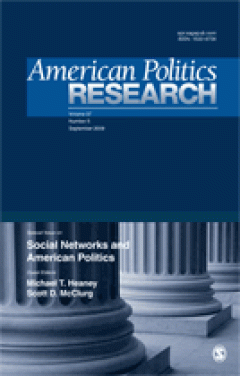Filter by

The Rhetorical Possibilities of “Home” in Homeland Security
The creation of the Department of Homeland Security introduced �homeland� as a new concept into American political rhetoric. Using common language, literature, and philological analysis, this article uncovers the wide array of meanings that the metaphor home generates. These meanings can expand and constrain the policy focus of an institution dedicated to �home�-land security. They define home …
- Edition
- Vol. 42 no. 6, September 2010. pp. 479-503
- ISBN/ISSN
- 00953997
- Collation
- -
- Series Title
- Administration & Society
- Call Number
- -

Rethinking Systems: Configurations of Politics and Policy in Contemporary Gov…
New governance patterns in Western democracies pose challenges to political analysis. Key here is the relationship of politics and policy. This article examines how this relationship is changing in terms of a communication systems shift. From this perspective, the adequacy of current frameworks of political analysis is called into question. The article applies this critical review to the rise o…
- Edition
- Vol. 42 no. 5, September 2010.pp. 504-525
- ISBN/ISSN
- 00953997
- Collation
- -
- Series Title
- Administration & Society
- Call Number
- -

Communicating Identity: The Use of Core Value Statements in Regulative Instit…
This study analyzes the core value statements of 25 regulative institutions located in 11 different OECD countries. Four types of institutions are studied: six tax agencies, six food safety authorities, four environmental protection agencies, and nine supreme audit institutions. The study shows that there is a clear emphasis on people-related and professional values. Based on these findings, I …
- Edition
- Vol. 42 no. 5, September 2010. pp. 526-549
- ISBN/ISSN
- 00953997
- Collation
- -
- Series Title
- Administration & Society
- Call Number
- -

Objective and Subjective Performance Measures: A Note on Terminology
At least since the late 1970s, the performance measurement literature has used different terminologies to describe agency- and citizen-generated performance measures. The first type of measures are placed into objective and the second type into subjective categories. This article argues that this terminology is outdated owing to evidence on the contextual subjectivity of all performance measure…
- Edition
- Vol. 42 no. 5, September 2010.pp. 550-567
- ISBN/ISSN
- 00953997
- Collation
- -
- Series Title
- Administration & Society
- Call Number
- -

Reconsidering Policy Feedback: How Policies Affect Politics
Drawing on examples from the history and politics of Social Security in the United States, this article assesses early and more recent contributions to the policy feedback literature to clarify the meaning of this concept before sketching a new research agenda on policy feedback. As argued, three new streams of policy feedback scholarship have emerged since the late 1990s. Because these new res…
- Edition
- Vol. 42 no. 5, September 2010.pp. 568-590
- ISBN/ISSN
- 00953997
- Collation
- -
- Series Title
- Administration & Society
- Call Number
- -

School Governance and Information: Does Choice Lead to Better-Informed Parents?
Political theorists have long argued that low information levels among average citizens provide the rationale for public policy to be guided by experts and elites. Other scholars counter that deference to elites perpetuates and even exacerbates the problem. Here we look at school choice programs as an environment to elucidate this important debate. Theories of school choice suggest that parents…
- Edition
- Vol. 38 no. 5, September 2010.pp. 783-805
- ISBN/ISSN
- 1532673x
- Collation
- -
- Series Title
- American Politics Research
- Call Number
- -

Exploiting the Opportunity for Reconstructive Leadership: Presidential Respon…
We seek to extend discourse on�the reconstructive presidency� to the edge of new frontiers in two interrelated ways. First, we argue that reconstructive presidents act within critical junctures in which they exploit periodic opportunities to revitalize enervated political regimes, but that failure to exploit such opportunities can also occur. Second, we clarify the tasks necessary for reconstru…
- Edition
- Vol. 38 no. 5, September 2010.pp. 806-841
- ISBN/ISSN
- 1532673x
- Collation
- -
- Series Title
- American Politics Research
- Call Number
- -

The Impact of State Legislative Term Limits on the Competitiveness of Congres…
This study examines the impact of state legislative term limits on the candidacy decisions of challengers in U.S. House elections. Using data from 1996 to 2006, the authors show that the impact of term limits is mitigated by local political factors, such as an incumbent�s election margin. The larger the incumbent�s previous electoral margin, the lower the likelihood of facing a quality challeng…
- Edition
- Vol. 38 no. 5, September 2010.pp. 842-861
- ISBN/ISSN
- 1532673x
- Collation
- -
- Series Title
- American Politics Research
- Call Number
- -

Emotional Appeals in Environmental Group Communications
Although emotional appeals are commonplace in political rhetoric, they are often viewed as manipulative and therefore threatening to democratic governance. Interest groups, in particular, have been blamed for relying on emotionally charged rhetoric to achieve fundraising objectives. Through a focus on 210 national-level environmental organizations, the author reevaluates this critique, postulat…
- Edition
- Vol. 38 no. 5, September 2010.pp. 862-889
- ISBN/ISSN
- 1532673x
- Collation
- -
- Series Title
- American Politics Research
- Call Number
- -

Individual Contributions: A Fundraising Advantage for the Ideologically Extreme?
Some ideologically extreme candidates appear to generate enthusiastic support from individual donors, but previous systematic analysis has found no overall fundraising benefits accruing to extremism. I propose that the similar amount of funds raised by extreme and moderate candidates masks different fundraising coalitions. Just as senior members of Congress may have a comparative advantage in r…
- Edition
- Vol. 38 no. 5, September 2010.pp. 890-908
- ISBN/ISSN
- 1532673x
- Collation
- -
- Series Title
- American Politics Research
- Call Number
- -

Context, Black Empowerment, and African American Political Participation
Activists and scholars argue that the election and presence of Black mayors increase Black political engagement; however, later research suggests that this diminishes over time. Furthermore, a body of research suggests that homogenous racial contexts and contextual poverty decrease political participation. In this article, we ask one question: How does demographic context and length of Black ma…
- Edition
- Vol. 38 no. 5, September 2010.pp. 909-930
- ISBN/ISSN
- 1532673x
- Collation
- -
- Series Title
- American Politics Research
- Call Number
- -

Divisive Primaries and Incumbent General Election Performance: Prospects and …
Do divisive primaries hurt incumbents? If so, does the electoral calendar condition their effects? Potential challengers are predatory and estimate their electoral chances before running against an incumbent, meaning electoral prospects influence both primary divisiveness and general election performance. However, divisive primaries may waste precious campaign resources and damage the primary w…
- Edition
- Vol. 38 no. 5, September 2010.pp. 931-955
- ISBN/ISSN
- 1532673x
- Collation
- -
- Series Title
- American Politics Research
- Call Number
- -

Childhood, age of consent and moral regulation in Canada and the UK
This paper analyses the resurgent regulation of young people's sexuality in Canada and the UK and examines notions of childhood in relation to adulthood, referred to by the term 'generation', as they are portrayed in the political process. In both cases, the political manipulation of the identity of childhood in relation to adulthood that is both gendered and generational is an important enabli…
- Edition
- Volume 16, Issue 3 September 2010 , pages 227 - 24
- ISBN/ISSN
- 13569775
- Collation
- -
- Series Title
- Contemporary Politics
- Call Number
- -

Political corruption, economic performance, and electoral outcomes: a cross-n…
The current study examines how the incumbent government's economic performance plays a role in mediating the impact of political corruption on electoral outcomes in 115 developing countries with relatively higher levels of corruption than Western consolidated democracies. Borrowing theoretical insights from the information-processing theory of voting, this study finds that political corruption …
- Edition
- Volume 16, Issue 3 September 2010 , pages 249 - 26
- ISBN/ISSN
- 13569775
- Collation
- -
- Series Title
- Contemporary Politics
- Call Number
- -

Sanction experience and sanction behavior: an analysis of Chinese perception …
This paper seeks to explore the interrelationship between a country's sanction experience, perception, and behavior. The analysis focuses on the case of China, which is one of very few countries that have not only undergone a number of significant economic sanctions but also have experience of imposing economic sanctions upon others. All historical cases of major economic sanctions against Chin…
- Edition
- Volume 16, Issue 3 September 2010 , pages 263 - 27
- ISBN/ISSN
- 13569775
- Collation
- -
- Series Title
- Contemporary Politics
- Call Number
- -

Calling on Jefferson: the 'custodiary' as the fourth estate in the Democratic…
Aimed at reinforcing the democratic values of freedom of speech and increased diversity in civic access to the means of communication, this paper examines the concept of democracy within an information and communication technology-mediated context. Discussion proceeds with an analysis of orthodox views adopted by Jefferson and the architects of the American Constitution. Building on the Jeffers…
- Edition
- Volume 16, Issue 3 September 2010 , pages 279 - 29
- ISBN/ISSN
- 13569775
- Collation
- -
- Series Title
- Contemporary Politics
- Call Number
- -

Twenty years after 1989: moving on from transitology
This article sets within a qualitative framework part of the social sciences research that has been carried out on Central and Eastern Europe since 1989. This qualitative study relies upon quantitative data from journal monitoring carried out on a number of thematic journals on post-Communist Europe. What the article demonstrates is that political science research on post-Communist Europe has a…
- Edition
- Volume 16, Issue 3 September 2010 , pages 301 - 31
- ISBN/ISSN
- 13569775
- Collation
- -
- Series Title
- Contemporary Politics
- Call Number
- -

Turkey's foreign policy options: Europe, the USA or Central Asia?
Accession to the European Union (EU) constitutes one of Turkey's primary foreign policy objectives. However, to establish whether the country would benefit from becoming part of an integrated Europe, its foreign policy alternatives to EU membership must also be examined. The first part of this article analyses Turkey's changing relations with Europe. Against this backdrop, the article then move…
- Edition
- Volume 16, Issue 3 September 2010 , pages 321 - 33
- ISBN/ISSN
- 13569775
- Collation
- -
- Series Title
- Contemporary Politics
- Call Number
- -

Social learning in a policy-mandated collaboration: community wildfire protec…
Policies such as the US Healthy Forests Restoration Act (HFRA) mandate collaboration in planning to create benefits such as social learning and shared understanding among partners. However, some question the ability of top-down policy to foster successful local collaboration. Through in-depth interviews and document analysis, this paper investigates social learning and transformative learning i…
- Edition
- Volume 53, Issue 6 September 2010 , pages 681 - 69
- ISBN/ISSN
- 09640568
- Collation
- -
- Series Title
- Journal of Environmental Planning and Management
- Call Number
- -

'A system that works for the sea'? Exploring Stakeholder Engagement in Marine…
This paper aims to contribute to the current debate on Marine Spatial Planning (MSP) by exploring the issue of stakeholder engagement. MSP is an emergent policy field that is subject to an increasing body of research, yet the role, scope and nature of participatory engagement within the process remains a neglected topic. This paper briefly reviews the nature of the 'marine problem', to which MS…
- Edition
- Volume 53, Issue 6 September 2010 , pages 701 - 72
- ISBN/ISSN
- 09640568
- Collation
- -
- Series Title
- Journal of Environmental Planning and Management
- Call Number
- -
 Computer Science, Information & General Works
Computer Science, Information & General Works  Philosophy & Psychology
Philosophy & Psychology  Religion
Religion  Social Sciences
Social Sciences  Language
Language  Pure Science
Pure Science  Applied Sciences
Applied Sciences  Art & Recreation
Art & Recreation  Literature
Literature  History & Geography
History & Geography